Patient education interventions for the management of inflammatory bowel disease
- PMID: 37172140
- PMCID: PMC10162698
- DOI: 10.1002/14651858.CD013854.pub2
Patient education interventions for the management of inflammatory bowel disease
Abstract
Background: Inflammatory bowel disease (IBD) is a life-long condition for which currently there is no cure. Patient educational interventions deliver structured information to their recipients. Evidence suggests patient education can have positive effects in other chronic diseases.
Objectives: To identify the different types of educational interventions, how they are delivered, and to determine their effectiveness and safety in people with IBD.
Search methods: On 27 November 2022, we searched CENTRAL, Embase, MEDLINE, ClinicalTrials.gov, and WHO ICTRP with no limitations to language, date, document type, or publication status. Any type of formal or informal educational intervention, lasting for any time, that had content focused directly on knowledge about IBD or skills needed for direct management of IBD or its symptoms was included. Delivery methods included face-to-face or remote educational sessions, workshops, guided study via the use of printed or online materials, the use of mobile applications, or any other method that delivers information to patients.
Selection criteria: All published, unpublished and ongoing randomised control trials (RCTs) that compare educational interventions targeted at people with IBD to any other type of intervention or no intervention.
Data collection and analysis: Two review authors independently conducted data extraction and risk of bias assessment of the included studies. We analysed data using Review Manager Web. We expressed dichotomous and continuous outcomes as risk ratios (RRs) and mean differences (MDs) with 95% confidence intervals (CIs). We assessed the certainty of the evidence using GRADE methodology.
Main results: We included 14 studies with a total of 2708 randomised participants, aged 11 to 75 years. Two studies examined populations who all had ulcerative colitis (UC); the remaining studies examined a mix of IBD patients (UC and Crohn's disease). Studies considered a range of disease activity states. The length of the interventions ranged from 30 minutes to 12 months. Education was provided in the form of in-person workshops/lectures, and remotely via printed materials or multimedia, smartphones and internet learning. Thirteen studies compared patient education interventions plus standard care against standard care alone. The interventions included seminars, information booklets, text messages, e-learning, a multi professional group-based programme, guidebooks, a staff-delivered programme based on an illustrated book, a standardised programme followed by group session, lectures alternating with group therapy, educational sessions based on an IBD guidebook, internet blog access and text messages, a structured education programme, and interactive videos. Risk of bias findings were concerning in all judgement areas across all studies. No single study was free of unclear or high of bias judgements. Reporting of most outcomes in a homogeneous fashion was limited, with quality of life at study end reported most commonly in six of the 14 studies which allowed for meta-analysis, with all other outcomes reported in a more heterogeneous manner that limited wider analysis. Two studies provided data on disease activity. There was no clear difference in disease activity when patient education (n = 277) combined with standard care was compared to standard care (n = 202). Patient education combined with standard care is probably equivalent to standard care in reducing disease activity in patients with IBD (standardised mean difference (SMD) -0.03, 95% CI -0.25 to 0.20), moderate-certainty evidence. Two studies provided continuous data on flare-up/relapse. There was no clear difference for flare-ups or relapse when patient education (n = 515) combined with standard care was compared to standard care (n = 507), as a continuous outcome. Patient education combined with standard care is probably equivalent to standard care in reducing flare-ups or relapse in patients with IBD (MD -0.00, 95% CI -0.06 to 0.05; moderate-certainty evidence). Three studies provided dichotomous data on flare-up/relapse. The evidence is very uncertain on whether patient education combined with standard care (n = 157) is different to standard care (n = 150) in reducing flare-ups or relapse in patients with IBD (RR 0.94, 95% CI 0.41 to 2.18; very low-certainty evidence). Six studies provided data on quality of life. There was no clear difference in quality of life when patient education combined with standard care (n = 721) was compared to standard care (n = 643). Patient education combined with standard care is probably equivalent to standard care in improving quality of life in patients with IBD (SMD 0.08, 95% CI -0.03 to 0.18; moderate-certainty evidence). The included studies did not report major differences on healthcare access. Medication adherence, patient knowledge and change in quality of life showed conflicting results that varied between no major differences and differences in favour of the educational interventions. Only five studies reported on adverse events. Four reported zero total adverse events and one reported one case of breast cancer and two cases of surgery in their interventions groups, and zero adverse events in their control group. Two studies compared delivery methods of patient education, specifically: web-based patient education interventions versus colour-printed books or text messages; and one study compared frequency of patient education, specifically: weekly educational text messages versus once every other week educational text messages. These did not show major differences for disease activity and quality of life. Other outcomes were not reported.
Authors' conclusions: The ways in which patient educational support surrounding IBD may impact on disease outcomes is complex. There is evidence that education added to standard care is probably of no benefit to disease activity or quality of life when compared with standard care, and may be of no benefit for occurrence of relapse when compared with standard care. However, as there was a paucity of specific information regarding the components of education or standard care, the utility of these findings is questionable. Further research on the impact of education on our primary outcomes of disease activity, flare-ups/relapse and quality of life is probably not indicated. However, further research is necessary, which should focus on reporting details of the educational interventions and study outcomes that educational interventions could be directly targeted to address, such as healthcare access and medication adherence. These should be informed by direct engagement with stakeholders and people affected by Crohn's and colitis.
Antecedentes: La enfermedad inflamatoria intestinal (EII) es una enfermedad crónica para la que no existe cura en la actualidad. Las intervenciones educativas para pacientes proporcionan información estructurada a sus destinatarios. La evidencia sugiere que la educación del paciente puede tener efectos positivos en otras enfermedades crónicas.
Objetivos: Identificar los diferentes tipos de intervenciones educativas, cómo se realizan y determinar su eficacia y seguridad en personas con EII. MÉTODOS DE BÚSQUEDA: El 27 de noviembre de 2022 se realizaron búsquedas en CENTRAL, Embase, MEDLINE, ClinicalTrials.gov y la ICTRP de la OMS sin limitaciones de idioma, fecha, tipo de documento o estado de publicación. Se incluyó cualquier tipo de intervención educativa formal o informal, de cualquier duración, cuyo contenido se centrara directamente en los conocimientos sobre la EII o en las habilidades necesarias para el control directo de la EII o sus síntomas. Los métodos de entrega incluyeron sesiones educativas presenciales o a distancia, talleres, estudio guiado mediante el uso de materiales impresos o en línea, el uso de aplicaciones móviles o cualquier otro método que proporcionara información a los pacientes. CRITERIOS DE SELECCIÓN: Todos los ensayos controlados aleatorizados (ECA) publicados, no publicados y en curso que comparen intervenciones educativas dirigidas a personas con EII con cualquier otro tipo de intervención o ninguna intervención. OBTENCIÓN Y ANÁLISIS DE LOS DATOS: Dos autores de la revisión realizaron de forma independiente la extracción de los datos y la evaluación del riesgo de sesgo de los estudios incluidos. Los datos se analizaron mediante Review Manager Web. Los desenlaces dicotómicos y continuos se expresaron como razones de riesgos (RR) y diferencias de medias (DM) con intervalos de confianza (IC) del 95%. La certeza de la evidencia se evaluó mediante el método GRADE.
Resultados principales: Se incluyeron 14 estudios con un total de 2708 participantes asignados al azar, de edades comprendidas entre los 11 y los 75 años. Dos estudios examinaron poblaciones que tenían todas colitis ulcerosa (CU); los estudios restantes examinaron una mezcla de pacientes con EII (CU y enfermedad de Crohn). Los estudios consideraron una serie de estados de actividad de la enfermedad. La duración de las intervenciones osciló entre 30 minutos y 12 meses. La educación se impartió en forma de talleres/conferencias presenciales y a distancia mediante material impreso o multimedia, teléfonos inteligentes y aprendizaje por Internet. Trece estudios compararon las intervenciones educativas para pacientes más la atención estándar con la atención estándar sola. Las intervenciones incluyeron seminarios, folletos informativos, mensajes de texto, aprendizaje electrónico, un programa multiprofesional basado en grupos, guías, un programa impartido por el personal basado en un libro ilustrado, un programa estandarizado seguido de una terapia grupal, conferencias alternadas con terapia grupal, sesiones educativas basadas en una guía sobre la EII, acceso a blogs de Internet y mensajes de texto, un programa educativo estructurado y vídeos interactivos. Los hallazgos de riesgo de sesgo fueron preocupantes en todas las áreas de valoración en todos los estudios. Ningún estudio estuvo libre de valoraciones de sesgo incierto o alto. El informe de la mayoría de los desenlaces de forma homogénea fue limitado, con la calidad de vida al final del estudio informada con mayor frecuencia en seis de los 14 estudios que permitieron el metanálisis, y todos los demás desenlaces fueron informados de forma más heterogénea, lo que impidió un análisis más amplio. Dos estudios proporcionaron datos sobre la actividad de la enfermedad. No hubo diferencias claras en la actividad de la enfermedad cuando se comparó la educación del paciente (n = 277) combinada con la atención estándar con la atención estándar sola (n = 202). La educación del paciente combinada con la atención estándar es probablemente equivalente a la atención estándar en la reducción de la actividad de la enfermedad en pacientes con EII (diferencia de medias estandarizada [DME] ‐0,03; IC del 95%: ‐0,25 a 0,20), evidencia de certeza moderada. Dos estudios proporcionaron datos continuos sobre las exacerbaciones/recaídas. No hubo diferencias claras en las exacerbaciones o recaídas cuando se comparó la educación del paciente (n = 515) combinada con la atención estándar con la atención estándar sola (n = 507), como desenlace continuo. La educación del paciente combinada con la atención estándar es probablemente equivalente a la atención estándar en la reducción de las exacerbaciones o recaídas en pacientes con EII (DM ‐0,00; IC del 95%: ‐0,06 a 0,05; evidencia de certeza moderada). Tres estudios proporcionaron datos dicotómicos sobre las exacerbaciones/recaídas. La evidencia es muy incierta en cuanto a si la educación del paciente combinada con la atención estándar (n = 157) es diferente de la atención estándar (n = 150) en la reducción de las exacerbaciones o recaídas en pacientes con EII (RR 0,94; IC del 95%: 0,41 a 2,18; evidencia de certeza muy baja). Seis estudios proporcionaron datos sobre la calidad de vida. No hubo diferencias claras en la calidad de vida cuando se comparó la educación del paciente combinada con la atención estándar (n = 721) con la atención estándar sola (n = 643). La educación del paciente combinada con la atención estándar es probablemente equivalente a la atención estándar para mejorar la calidad de vida en los pacientes con EII (DME 0,08; IC del 95%: ‐0,03 a 0,18; evidencia de certeza moderada). Los estudios incluidos no informaron de diferencias importantes en el acceso a la asistencia sanitaria. La adherencia a la medicación, el conocimiento de los pacientes y el cambio en la calidad de vida mostraron resultados contradictorios que oscilaron entre la falta de diferencias importantes y las diferencias a favor de las intervenciones educativas. Solo cinco estudios informaron sobre los eventos adversos. Cuatro informaron cero eventos adversos totales y uno informó un caso de cáncer de mama y dos casos de cirugía en sus grupos de intervención, y cero eventos adversos en su grupo de control. Dos estudios compararon los métodos de entrega de la educación del paciente, en concreto: intervenciones educativas para pacientes a través de la web versus libros impresos a color o mensajes de texto; y un estudio comparó la frecuencia de la educación del paciente, en concreto: mensajes de texto educativos semanales versus mensajes de texto educativos una vez cada dos semanas. Estos no mostraron diferencias importantes en cuanto a la actividad de la enfermedad y la calidad de vida. No se informaron otros desenlaces.
Conclusiones de los autores: Las formas en que el apoyo educativo al paciente en torno a la EII podría influir en los desenlaces de la enfermedad son complejas. Existe evidencia de que la educación añadida a la atención estándar probablemente no tenga efectos beneficiosos en la actividad de la enfermedad o la calidad de vida en comparación con la atención estándar, y podría no tener beneficios en la aparición de recaídas en comparación con la atención estándar. Sin embargo, como hubo escasa información específica sobre los componentes de la educación o la atención estándar, la utilidad de estos hallazgos es cuestionable. Probablemente no esté indicado investigar más sobre el impacto de la educación en los desenlaces principales de la actividad de la enfermedad, las exacerbaciones/recaídas ni la calidad de vida. Sin embargo, se necesitan más estudios de investigación que deberían centrarse en informar sobre los detalles de las intervenciones educativas y estudiar los desenlaces que las intervenciones educativas podrían abordar directamente, como el acceso a la atención sanitaria y la adherencia a la medicación. Éstas deben basarse en el compromiso directo con las partes interesadas y las personas afectadas por la enfermedad de Crohn y la colitis.
Copyright © 2023 The Authors. Cochrane Database of Systematic Reviews published by John Wiley & Sons, Ltd. on behalf of The Cochrane Collaboration.
Conflict of interest statement
MG: none. As a Cochrane Gut editor, MG was not involved with the editorial process for this review.
VS: none.
UI: none.
MA: none.
KB: none.
AA: none. As a Cochrane Gut editor, AKA was not involved with the editorial process for this review.
Figures
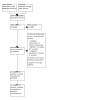
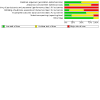
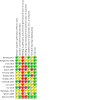
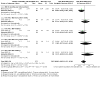
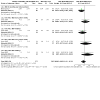
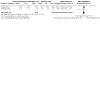
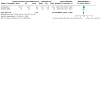

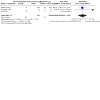
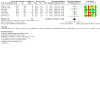
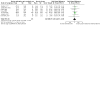

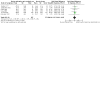

Update of
- doi: 10.1002/14651858.CD013854
References
References to studies included in this review
Berding 2017 {published data only}
-
- Berding A, Witte C, Gottschald M, Kaltz B, Weiland R, Gerlich C. Beneficial effects of education on emotional distress, self-management, and coping in patients with inflammatory bowel disease: a prospective randomized controlled study. Inflammatory Intestinal Diseases 2016;1(4):182-90. - PMC - PubMed
-
- Witte C, Kaltz B, Berding A, Weiland R, Reusch A, Faller H. Effectiveness of patient education in inflammatory bowel disease. Journal of Crohn's and Colitis 2016;10(1):S378.
Borgaonkar 2002 {published data only}
-
- Borgaonkar MR, Townson G, Donnelly M, Irvine EJ. Providing disease-related information worsens health-related quality of life in inflammatory bowel disease. Inflammatory Bowel Diseases 2002;8(4):264-9. - PubMed
Cross 2019 {published data only}
-
- Abutaleb A, Langenberg P, Regueiro M, Schwartz DA, Tracy KJ, Ghazi L, et al. Delivery of weekly educational messages to patients with inflammatory bowel disease through a telemedicine system improves their disease-specific knowledge over 1 year. American Journal of Gastroenterology 2017;112:S420.
-
- Bilgrami Z, Abutaleb A, Chudy‑Onwugaje K, Langenberg P, Regueiro M, Schwartz DA, et al. Effect of TELEmedicine for infammatory bowel disease on patient activation and self‑efficacy. Gastroenterology 2019;156((6 Supplement 1)):S1110.
-
- Cross RK, Jambaulikar G, Langenberg P, Tracy JK, Collins JF, Katz J, et al. TELEmedicine for patients with Inflammatory Bowel Disease (TELE-IBD): design and implementation of randomized clinical trial. Contemporary Clinical Trials 2015;42:132-44. - PubMed
-
- Cross RK, Langenberg P, Regueiro M, Schwartz DA, Tracy JK, Collins JF, et al. A randomized controlled trial of TELEmedicine for patients with inflammatory bowel disease (TELE-IBD). Official journal of the American College of Gastroenterology 2019;114(3):472-82. - PubMed
De Jong 2017 {published data only}
-
- De Jong MJ, Boonen A, Van der Meulen-de AE, Romberg-Camps MJ, Van Bodegraven AA, Mahmmod N, et al. Telemedicine for management of inflammatory bowel disease (myIBDcoach): a pragmatic, multicentre, randomised controlled trial. Lancet 2017;390(10098):959-68. - PubMed
-
- Hameeteman W, De Jong M, Jonkers D, Masclee A, Pierik M, Van Der Meulen-de Jong A, et al. Telemedicine for inflammatory bowel disease patients with myIBDcoach: Description of the myIBDcoach trial. Journal of Crohn's and Colitis;10(1):S198.
-
- NCT02173002. Integrated care for inflammatory bowel disease patients in the Netherlands with the novel Telemedicine Tool myIBDcoach: a randomized controlled trial. https://clinicaltrials.gov/ct2/show/NCT02173002 (First posted 24 June 2014).
-
- Jong M J, Boonen A, Meulen-de AE, Romberg-Camps MJ, Bodegraven AA, Mahmmod N, et al. Cost-effectiveness of telemedicine-directed specialized vs standard care for patients with inflammatory bowel diseases in a randomized trial. Clinical Gastroenterology and Hepatology 2020;18(8):1744-52. - PubMed
Jaghult 2007 {published data only}
-
- Jäghult S, Larson J, Wredling R, Kapraali M. A multiprofessional education programme for patients with inflammatory bowel disease: a randomized controlled trial. Scandinavian Journal of Gastroenterology 2007;42(12):1452-9. - PubMed
Kennedy 2002 {published data only}
-
- Kennedy A, Nelson E, Reeves D, Richardson G, Roberts C, Robinson A, et al. A randomised controlled trial to assess the impact of a package comprising a patient-orientated, evidence-based self-help guidebook and patient-centred consultations on disease management and satisfaction in inflammatory bowel disease. Health Technology Assessment 2003;7(28):1-113. - PubMed
-
- Kennedy A, Robinson A, Hann M, Thompson D, Wilkin D, North‐West Region Gastrointestinal Research Group. A cluster‐randomised controlled trial of a patient‐centred guidebook for patients with ulcerative colitis: effect on knowledge, anxiety and quality of life. Health & Social Care in the Community 2003;11(1):64-72. - PubMed
-
- Kennedy AP, Rogers AE. Improving patient involvement in chronic disease management: the views of patients, GPs and specialists on a guidebook for ulcerative colitis. Patient Education and Counseling 2002;47(3):257-63. - PubMed
Moreau 2021 {published data only}
-
- Moreau J, Hammoudi N, Marthey L, Trang-Poisson C, Nachury M, Altwegg R, et al. Impact of an education programme on IBD patients’ skills: Results of a randomised controlled multicentre study [ECIPE]. Journal of Crohn's and Colitis 2021;15(3):432-40. - PubMed
-
- Moreau J, Marthey L, Trang C, Nachury M, Altwegg R, Grimaud JC, et al. Impact of an education programme on IBD patient's skills: One year results of the ECIPE randomised, controlled multicentre study. Journal of Crohn's and Colitis 2016;10:S51–2. - PubMed
-
- NCT02550158. A study evaluating the impact of an educational program (EDU-MICI) on patients with inflammatory bowel disease (ECIPE). https://clinicaltrials.gov/ct2/show/NCT02550158 (First Posted 15 September 2015).
Nikolaus 2017 {published data only}
-
- Nikolaus S, Schreiber S, Siegmund B, Bokemeyer B, B ¨astlein E, Bachmann O, et al. DOP044 Patient education in a 14 month randomized trial fails to improve adherence in ulcerative colitis: Influence of demographic and clinical parameters on non-adherence. Journal of Crohn's and Colitis 2014;8(1):S36. - PubMed
-
- Nikolaus S, Schreiber S, Siegmund B, Bokemeyer B, Baestlein E, Bachmann O, et al. Patient education in a 14 month randomized trial fails to improve adherence in ulcerative colitis: Influence of demographic and clinical parameters on non-adherence. Gastroenterology 2014;146(5):S367. - PubMed
-
- Nikolaus S, Schreiber S, Siegmund B, Bokemeyer B, Bästlein E, Bachmann O, et al. Patient education in a 14-month randomised trial fails to improve adherence in ulcerative colitis: Influence of demographic and clinical parameters on non-adherence. Journal of Crohn's and Colitis 2017;11(9):1052-62. - PubMed
Oxelmark 2007 {published data only}
-
- Oxelmark L, Magnusson A, Löfberg R, Hillerås P. Group-based intervention program in inflammatory bowel disease patients: effects on quality of life. Inflammatory Bowel Diseases 2007;13(2):182-90. - PubMed
Uran 2019 {published data only}
-
- Uran B N, Yildirim Y, Aykar F S, Unsal B. The effect of web-based education on disease activity, symptom management and quality of life in patients with inflammatory bowel disease: randomized-controlled study. Medical Science 2019;23(98):418-31.
-
- Uran BN, Yildirim Y, Aykar FS, Unsal B. N031 The effect of web-based education on disease activity, symptom management, and quality of life on patients with inflammatory bowel disease. Journal of Crohn's and Colitis 2018;12(1):S582.
Vaz 2019 {published data only}
Walkiewicz 2011 {published data only}
-
- Walkiewicz D, Saha S, Garrison J. Web‐based and mobile phone technologies are effective methods for increasing disease‐related knowledge in adolescents with Inflammatory Bowel Disease. Inflammatory Bowel Diseases 2011;17:S55.
Waters 2005 {published data only}
-
- Waters BM, Jensen L, Fedorak RN. Effects of formal education for patients with inflammatory bowel disease: a randomized controlled trial. Canadian Journal of Gastroenterology 2005;19(4):235-44. - PubMed
Weizman 2021 {published data only}
-
- Weizman AV, Bressler B, Seow CH, Afif W, Targownik L E, Afzal NM, et al. Patient empowerment through an educational intervention improves patient satisfaction and trust in physician among hospitalized patients with ulcerative colitis. Gastroenterology 2019;156(6):432.
References to studies excluded from this review
Bregenzer 2005 {published data only}
-
- Bregenzer N, Lange A, Fürst A, Gross V, Schölmerich J, Andus T. Patient education in inflammatory bowel disease does not influence patients knowledge and long-term psychosocial well-being. Zeitschrift für Gastroenterologie 2005;43(4):367-71. - PubMed
Chapman 2020 {published data only}
-
- Chapman S, Sibelli A, Jones AS, Forbes A, Chater A, Horne R. Personalised Adherence Support for Maintenance Treatment of Inflammatory Bowel Disease: A Tailored Digital Intervention to Change Adherence-related Beliefs and Barriers. J Crohns Colitis 2020;14(10):1394-404. - PubMed
Cheema 2020 {published data only}
-
- Cheema M, Mitrev N, Tiongson M, Ahlenstiel G, Hall L, Kariyawasam V. Access to inflammatory bowel disease nurses and education is associated with less stress, anxiety, and depression: Australian national inflammatory bowel disease survey. Journal of Gastroenterology and Hepatology 2020;35:132. - PMC - PubMed
Cross 2012 {published data only}
-
- NCT01692743. Telemedicine in Patients With Inflammatory Bowel Disease (TELE-IBD). https://clinicaltrials.gov/ct2/show/NCT01692743 (First posted 25 September 2012).
Dewulf 2011 {published data only}
-
- Dewulf NL, Santos VD, Pereira LR, Troncon LE. A structured program of pharmaceutical care benefits outpatients with inflammatory bowel diseases undergoing continuous drug therapy. Gastroenterology 2011;140(5):207.
Eaden 2002 {published data only}
-
- Eaden J, Abrams K, Shears J, Mayberry J. A randomized controlled trial comparing the efficacy of a video and information leaflet vs information leaflet alone on patient knowledge about surveillance and cancer risk in ulcerative colitis. Gut 2000;46(2):A20. - PubMed
-
- Eaden J, Abrams K, Shears J, Mayberry J. Randomized controlled trial comparing the efficacy of a video and information leaflet versus information leaflet alone on patient knowledge about surveillance and cancer risk in ulcerative colitis. Inflammatory Bowel Diseases 2002;8(6):407-12. - PubMed
Elkjaer 2010a {published data only}
-
- Elkjaer M, Shuhaibar M, Burisch J, Bailey Y, Scherfig H, Laugesen B, et al. E-health empowers patients with ulcerative colitis: a randomised controlled trial of the web-guided ‘Constant-care’ approach. Gut 2010;59(12):1652-61. - PubMed
Elkjaer 2010b {published data only}
-
- Elkjaer M, Burisch J, Avnstrøm S, Lynge E, Munkholm P. Development of a web-based concept for patients with ulcerative colitis and 5-aminosalicylic acid treatment. European Journal of Gastroenterology & Hepatology 2010;22(6):695-704. - PubMed
Gerbarg 2015 {published data only}
-
- Gerbarg PL, Jacob VE, Stevens L, Bosworth BP, Chabouni F, DeFilippis EM, et al. The effect of breathing, movement, and meditation on psychological and physical symptoms and inflammatory biomarkers in inflammatory bowel disease: a randomized controlled trial. Inflammatory Bowel Diseases 2015;21(12):2886-96. - PubMed
Greenley 2015 {published data only}
-
- Greenley RN, Gumidyala AP, Nguyen E, Plevinsky JM, Poulopoulos N, Thomason MM, et al. Can you teach a teen new tricks? Problem solving skills training improves oral medication adherence in pediatric patients with inflammatory bowel disease participating in a randomized trial. Inflammatory Bowel Diseases 2015;21(11):2649-57. - PubMed
Hueppe 2020 {published data only}
-
- Hueppe A, Langbrandtner J, Raspe H. Inviting patients with inflammatory bowel disease to active involvement in their own care: a randomized controlled trial. Inflammatory Bowel Diseases 2014;20(6):1057-69. - PubMed
IRCT2015041921850N1 {published data only}
-
- IRCT2015041921850N1. The effect of psychological educational interventions on physical and mental symptoms of patients with inflammatory bowel disease. https://en.irct.ir/trial/19014 (first posted 12 January 2016).
Kamat 2018 {published data only}
-
- Kamat N, Rajan MS, Sharma PS, Kamath A, Pai CG. Video assisted patient education improves compliance with follow up and depression scores in inflammatory bowel diseases. Postgraduate Medicine 2018;130(3):355-60. - PubMed
Karia 2012 {published data only}
-
- Stunkel L, Karia K, Okoji O, Warren R, Jean T, Jacob V. Impact on Quality of life of a smart device mobile application in patients with inflammatory bowel disease. American Journal of Gastroenterology 2012;107:S635-6.
Korzenik 2016 {published data only}
-
- Korzenik J R, Kirby H, Kagan L, Currier M, Norton B, Nadkarni A, et al. A study of a novel pilot program to address the psychosocial needs of IBD patients: possible impact on disease outcome and reduction of health care utilization. Gastroenterology 2016;150(4):S1005.
Kyaw 2014 {published data only}
-
- Kyaw M H, Moshkovska T, Mayberry J. A prospective, randomized, controlled, exploratory study of comprehensive dietary advice in ulcerative colitis: impact on disease activity and quality of life. European journal of gastroenterology & hepatology 2014;26(8):910-7. - PubMed
-
- Kyaw M, Moshkovska T, Bagewadi A, Mayberry J. Dietary advice both significantly reduces colitis disease activity, steroid requirement and increases quality of life in patients with ulcerative colitis. Gut 2011;60(1):A97.
Lange 1996 {published data only}
-
- Lange A, Haslbeck E, Andus T, Bregenzer N, Gross V. Outpatient training for patients with Crohn's disease / ulcerative colitis [Ambulante Schulung bei Patienten mit Morbus Crohn/Colitis ulcerosa]. Zeitschrift für Gastroenterologie 1996;34(7):411-5. - PubMed
Ley 2020 {published data only}
-
- Ley D, Martin B, Caldera F. Use of an iphone application to increase adherence in patients with ulcerative colitis in remission: a randomized controlled trial. Inflammatory Bowel Diseases 2020;26(5):e33-4. - PubMed
-
- NCT02120391. Improving knowledge of medication in ulcerative colitis with an iPhone application. https://clinicaltrials.gov/ct2/show/NCT02120391 (First posted 22 April 2014).
Lim 2020 {published data only}
Long 2020 {published data only}
-
- Long M, Zhang X, Chen W, Zubrod L, Maris R, Van Deen W K, et al. S0669 Project PREVENT: a randomized controlled trial of preventive interventions in patients with inflammatory bowel disease. Official journal of the American College of Gastroenterology 2020;115:335-6.
Maya 2012 {published data only}
-
- Kamakura Y. Development and effectiveness verification of dietary guidance program for Crohn's disease patients. Journal of the Japanese Society of Nursing Science 2012;32(3):74-84.
Meng 2018 {published data only}
-
- Meng K, Reusch A, Musekamp G, Seekatz B, Zietz B, Steimann G, et al. Self-management education for rehabilitation inpatients: a cluster-randomized controlled trial. Patient Education and Counseling 2018;101(9):1630-8. - PubMed
NCT00248742 {published data only}
-
- NCT00248742. Psychobiology in Inflammatory Bowel Disease(IBD) (INSPIRE). https://clinicaltrials.gov/ct2/show/NCT00248742 (first posted 4 November 2005).
NCT03059186 {published data only}
-
- NCT03059186. A Gratitude Intervention in improving well-being and coping in people living with Inflammatory Bowel Disease. https://clinicaltrials.gov/ct2/show/NCT03059186 (First posted 23 February 2017).
NCT03186872 {published data only}
-
- NCT03186872. Improving quality of care with a digital behavioral program in IBD patient centered medical home. https://clinicaltrials.gov/ct2/show/NCT03186872 (first posted 14 June 2017).
NCT04207008 {published data only}
-
- NCT04207008. Trial of a decision support intervention for adolescents and young adults with ulcerative colitis. https://clinicaltrials.gov/ct2/show/NCT04207008 (First posted 20 December 2019).
Norton 2015 {published data only}
-
- Norton C, Dibley L B, Hart A, Duncan J, Emmanuel A, Knowles CH, et al. Faecal incontinence intervention study (FINS): self-management booklet information with or without nurse support to improve continence in people with inflammatory bowel disease: study protocol for a randomized controlled trial. Trials 2015;16(1):1-9. - PMC - PubMed
Reusch 2016 {published data only}
-
- Reusch A, Weiland R, Gerlich C, Dreger K, Derra C, Mainos D, et al. Self-management education for rehabilitation inpatients suffering from inflammatory bowel disease: a cluster-randomized controlled trial. Health Education Research 2016;31(6):782–91. - PubMed
Robinson 2001 {published data only}
-
- Robinson A, Thompson DG, Wilkin D, Roberts C. Guided self-management and patient-directed follow-up of ulcerative colitis: a randomised trial. Lancet 2001;358(9286):976-81. - PubMed
Schimdt 2018 {published data only}
-
- Schmidt S, Markwart H, Bomba F, Muehlan H, Findeisen A, Kohl M, et al. Differential effect of a patient-education transition intervention in adolescents with IBD vs. diabetes. European Journal of Pediatrics 2018;177(4):497-505. - PubMed
Siegel 2018 {published data only}
-
- Siegel C A, Thompson K D, Siegel LS, MacKenzie T, Dubinsky M. SU19-11- Crohn’s disease decision aid leads to more patients choosing combination therapy in a cluster randomised controlled trial. Journal of Crohn's and Colitis 2018;12(6):630.
Sutton 2019 {published data only}
Tsavdaroglou 2019 {published data only}
-
- Tsavdaroglou T, Mantzaris G, Tsavdaroglou A, Fotos N, Brokalaki H. Inflammatory bowel disease and pregnancy: The impact of education in knowledge and attitude of women in reproductive age; one-year followup study. Journal of Crohn's and Colitis 2019;13(1):S556-7.
Tung 2015 {published data only}
-
- Tung J, Grunow J E, Jacobs N. Pilot development of an electronic pediatric inflammatory bowel disease quiz game. Journal of Pediatric Gastroenterology and Nutrition 2015;61(3):292-6. - PubMed
Wang 2020 {published data only}
Wierstra 2018 {published data only}
-
- Wierstra K, Smith K, Bal J, Ambrosio L, Kroeker K I, Dieleman L, et al. An online educational portal is effective in improving knowledge regarding reproduction and IBD. Journal of Crohn's and Colitis 2016;10(1):308-9.
-
- Wierstra K, Smith KM, Bal J, Ambrosio L, Dieleman LA, Halloran BP, et al. An Online Educational Portal Is Effective in Improving Knowledge Regarding Reproduction and IBD. Gastroenterology 2016;150(4):792.
-
- Wierstra K, Smith, K, Ambrosio L, Kroeker K, Huang V, Dieleman L, et al. An online educational portal is effective in improving knowledge regarding reproduction and IBD. Canadian Journal of Gastroenterology and Hepatology 2016;150(4):S792.
-
- Wierstra K, Sutton R, Bal J, Ismond K, Dieleman L, Halloran B, et al. Innovative online educational portal improves disease-specific reproductive knowledge among patients with inflammatory bowel disease. Inflammatory bowel diseases 2018;24(12):2483-93. - PubMed
Zhang 2020 {published data only}
References to studies awaiting assessment
Almario 2022 {published data only}
Atreja 2015 {published data only}
-
- Atreja A, Khan S, Otobo E, Rogers J, Ullman T, Grinspan A. Impact of real world home-based remote monitoring on quality of care and quality of life in IBD patients: interim results of pragmatic randomized trial. Gastroenterology 2017;152(5):S600-1.
-
- Atreja A, Khan S, Otobo E, Rogers J, Ullman T, Grinspan A. P554 Impact of real world home based remote monitoring on quality of care and quality of life in inflammatory bowel disease patients: one year results of pragmatic randomized trial. Journal of Crohn's and Colitis 2017;11(1):S362-3.
-
- Atreja A, Khan S, Rogers J D, Otobo E, Patel N P, Ullman T, et al. Impact of the mobile HealthPROMISE platform on the quality of care and quality of life in patients with inflammatory bowel disease: study protocol of a pragmatic randomized controlled trial. JMIR Research Pprotocols 2015;4(1):e23. - PMC - PubMed
-
- Atreja A, Otobo E, Chandnani M, Rupani K, Rogers J, Szigethy E, et al. Tu1994 Documentation of IBD quality of care and psychosocial metrics among patients with IBD: Baseline analysis of ongoing pragmatic randomized controlled trial. Gastroenterology 2016;150(4):S1000.
-
- Atreja A, Otobo E, Szigethy E, Kohli A, Shroff H, Chang H, et al. Improved quality of care and quality of life for IBD patients using mobile based remote monitoring platform: A randomized control trial. Inflammatory Bowel Diseases 2018;24(1):S21-2.
De Dycker 2022 {published data only}
-
- De Dycker E, Hoefkens E, Asnong K, Geens P, Lembrechts N, Lambrechts T, et al. Type of patient education impacts the willingness to switch from an IV to SC of a biological in patients with Inflammatory Bowel Disease: a multicentre, comparative study. Journal of Crohn's and Colitis 2022;16(Supplement_1):i617-8.
DRKS00022935 {published data only}
-
- DRKS00022935. Patient education via Instagram: Medical knowledge transfer in patients with inflammatory bowel disease. https://www.drks.de/drks_web/navigate.do?navigationId=trial.HTML&TRI... (First posted 24 August 2020).
Haslbeck 1996 {published data only}
-
- Haslbeck E. PhD Thesis. University of Regensburg, Department of Clinical Psychology, 1993.
-
- Lange A. Patient education in inflammatory bowel disease. Zeitschrift fur Gastroenterologie 1996;34(7):411-5. - PubMed
Homel 2015 {published data only}
IRCT20180520039736N1 {published data only}
-
- IRCT20180520039736N1. Development of lifestyle educational package and comparing its effectiveness with mindfulness-based cognitive therapy on disease activity and related psychological variables in patients with ulcerative colitis. https://en.irct.ir/trial/31323 (Registered on 13 June 2018);(l).
IRCT20191026045251N1 {published data only}
-
- IRCT20191026045251N1. Comparison of the effect of self-care education with two methods smartphone app and Teach Back methods on the lifestyle and quality of life of patients with inflammatory bowel disease. https://en.irct.ir/trial/43342 (Registered on 30 August 2020).
ISRCTN67674151 {published data only}
-
- ISRCTN67674151. A nurse-led intervention to enhance medication adherence in ulcerative colitis (UC) using a concordance-led consultation. https://www.isrctn.com/ISRCTN67674151?q=ISRCTN67674151&filters=&... (date applied 14 April 2004).
Lorenzon 2016 {published data only}
-
- Lorenzon G, Vettorato MG, De Marchi E, Bartolo O, Caccaro R, Cavallin F, et al. Patient support programme is well accepted and could help adherence in inflammatory bowel disease patients. Gastroenterology 2016;150(3):S797.
Magharei 2019 {published data only}
-
- IRCT2016092429823N1. The impact of management training on self-efficacy and quality of life of patients with Ulcerative colitis. https://en.irct.ir/trial/23877 (Registered on 9 November 2016).
-
- Magharei M, Jaafari S, Mansouri P, Safarpour A, Taghavi SA. Effects of Self-Management Education on Self-Efficacy and Quality of Life in Patients with Ulcerative Colitis: A Randomized Controlled Clinical Trial. International journal of community based nursing and midwifery 2019;7(1):32. - PMC - PubMed
Martinato 2022 {published data only}
-
- Martinato M, Comoretto RI, Monaco E, Ocagli H, Gregori D. Disease knowledge and quality of life perception in Inflammatory Bowel Disease: a randomised controlled trial. Journal of Crohn's and Colitis 2022;16(Supplement_1):i621.
Menze 2022 {published data only}
-
- Menze L, Wenzl TG, Pappa A. KARLOTTA (Kids+ Adolescents Research Learning On Tablet Teaching Aachen)-randomized controlled pilot study for the implementation of a digital educational app with game of skill for pediatric patients with inflammatory bowel disease. [KARLOTTA (Kids+ Adolescents Research Learning On Tablet Teaching Aachen)–randomisierte kontrollierte Pilotstudie zur Anwendung eines digitalen Lernspiels für pädiatrische Patienten mit chronisch entzündlichen Darmerkrankungen]. Zeitschrift fur Gastroenterologie 2022;no volume:no pagination. - PubMed
Moshkovska 2010 {published data only}
-
- Moshkovska T, Mayberry J, Stone MA, Baker R, Bankart J, Smith RM. The benefit of a tailored patient preference intervention in adherence to 5- ASA medication in ulcerative colitis: Results from a randomised controlled trial. Gastroenterology 2010;138(5):S518. - PubMed
NCT03695783 {published data only}
-
- NCT03695783. The IBD&me randomized controlled trial. https://clinicaltrials.gov/ct2/show/NCT03695783 (First posted 4 Octtober 2018).
NCT04183608 {published data only}
-
- NCT04183608. A trial comparing standard of care versus treat to target with telemonitoring and patient education in patients with ulcerative colitis initiating adalimumab (CONTROL). https://clinicaltrials.gov/ct2/show/NCT04183608 (first posted December 3, 2019).
Otilia 2019 {published data only}
-
- Otilia G, Dranga M, Soponaru C, Prelipcean CC, Mihai C. Support group and IBD patients quality of life. Journal of Gastrointestinal and Liver Diseases 2019;18:125. [CENTRAL: 30 September 2020 | 2020 Issue 09]
Stewart 2009 {published data only}
-
- Stewart M, MacIntosh D, Phalen-Kelly K, Stewart J. Disease specific teaching by a nurse educator: A randomized trial. Canadian Journal of Gastroenterology 2009;23:no pagination.
Ying 2020 {published data only}
-
- Ying X, Zhang X, Sang H, Li S , Fan Y, Li M. Study on micro-lecture and workshop education model in tube-fed home enteral nutrition support for inflammatory bowel disease patients [微小授業とワークショップ教育モデル炎症性腸疾患患者における経管栄養の経腸栄養における研究【JST・京大機械翻訳】]. Chinese Journal of Clinical Nutrition 2020;28(2):101-5. [REFERENCE NUMBER: 21A0126543]
Zhuo 2021 {published data only}
-
- Zhuo LL, Zhuge WW, Ding YR. Impact of TTM-oriented health promotion and education method based on WeChat platform on positive emotions, negative emotions, and self-care ability of patients with ulcerative colitis [基于微信平台以 TTM 为导向的健康宣教法对溃疡性结肠炎患者正性情感, 负性情感及自护能力的影响]. World Chinese Jjournal of Digestology 2021;29(19):1144-50.
References to ongoing studies
IRCT201510137612N2 {published data only}
-
- IRCT201510137612N2. A Clinical trial to study the effect of information prescription in reducing relaps among patients with inflammatory bowel disease. https://en.irct.ir/trial/8095 (Registered on 24 May 2016).
IRCT20170731035424N2 {published data only}
-
- IRCT20170731035424N2. The effect of an educational-supportive program based on chronic care model on self-efficacy and health related quality of life of patients with ulcerative colitis. https://www.irct.ir/trial/54337 (first received 19 September 2021).
IRCT20200613047757N1 {published data only}
-
- IRCT20200613047757N1. Evaluation of the effectiveness of mobile-based inflammatory bowel disease management system by using gamification techniques on disease activity index, mental health and quality of life. https://www.irct.ir/trial/59842 (first received 16 November 2021).
Kim 2020 {published data only}
-
- ACTRN12617001246370. A cluster randomised controlled trial of a decision Aid (myAID) for ulcerative colitis patients to enhance patients quality of life, empowerment, quality of decision making and disease control [Use of an internet-based decision aid (myAID) for ulcerative colitis patients to improve quality of life, empowerment, decision making and disease control]. https://www.anzctr.org.au/Trial/Registration/TrialReview.aspx?id=373313 (date submitted 19 August 2017). - PMC - PubMed
-
- Kim AH, Girgis A, Karimi N, Sechi AJ, Descallar J, Andrews JM, et al. A web-based decision Aid (myAID) to enhance quality of life, empowerment, decision making, and disease control for patients with ulcerative colitis: protocol for a cluster randomized controlled trial. JMIR Research Pprotocols 2020;9(7):e15994. - PMC - PubMed
NCT03827109 {published data only}
-
- NCT03827109 [Peer Mentoring to improve self-management in youth with IBD]. https://clinicaltrials.gov/ct2/show/NCT03827109 (First posted 1 February 2019).
RBR‐79dn4k {published data only}
-
- RBR-79dn4k. Impact of an intervention program on nonadherence to drugs in ulcerative colitis patients: randomized clinical trial [Impacto de um programa de intervenções na não-adesão a medicamentos em pacientes de Retocolite Ulcerativa: ensaio clínico randomizado]. https://ensaiosclinicos.gov.br/rg/RBR-79dn4k (Registered 1 February 2020).
Additional references
Alsayed Hassan 2020
Anderson 2017
Burisch 2013
-
- Burisch J, Jess T, Martinato M, Lakatos PL. The burden of inflammatory bowel disease in Europe. Journal of Crohn's and Colitis 2013;7(4):322-37. - PubMed
Conn 2016
Daniel 2021
-
- Daniel M, Gordon M, Patricio M, Hider A, Pawlik C, Bhagdev R, et al. An update on developments in medical education in response to the COVID-19 pandemic: A BEME scoping review: BEME Guide No. 64. Medical Teacher 2021;43:253-71. - PubMed
De Souza 2017
-
- De Souza HS, Fiocchi C, Iliopoulos D. The IBD interactome: an integrated view of aetiology, pathogenesis and therapy. Nature Reviews. Gastroenterology & Hepatology 2017;14(12):739-49. - PubMed
Egger 1997
Glanville 2019
-
- Glanville J, Foxlee R, Wisniewski S, Noel-Storr A, Edwards M, Dooley G. Translating the Cochrane EMBASE RCT filter from the Ovid interface to Embase.com: a case study. Health Information andl Libraries Journal 2019;36(3):264-77. [PMID: ] - PubMed
Gordon 2011
-
- Gordon M, Findley R. Educational interventions to improve handover in health care: a systematic review. Medical Education 2011;45(11):1081-9. - PubMed
Gordon 2013
-
- Gordon M. Non-technical skills training to enhance patient safety. Clinical Teacher 2013;10:170-5. - PubMed
Gordon 2016
Gordon 2020
-
- Gordon M, Guyatt G. Assessment of evidence quality in inflammatory bowel disease guidance: the use and misuse of GRADE. Gastroenterology 2020;159:1209-15. - PubMed
GRADE 2015 [Computer program]
-
- GRADEpro GDT. Hamilton (ON): McMaster University (developed by Evidence Prime), 2015. Available at gradepro.org.
Guyatt 1989
-
- Guyatt G, Mitchell A. A new measure of health status for clinical trials in inflammatory bowel disease. Gastroenterology 1989;96:804-10. - PubMed
Higgins 2011
-
- Higgins JP, Green S, editor(s). Cochrane Handbook for Systematic Reviews of Interventions Version 5.1.0 (updated March 2011). The Cochrane Collaboration, 2011. Available from training.cochrane.org/handbook/archive/v5.1/, 2011.
Higgins 2020
-
- Higgins JP, Thomas J, Chandler J, Cumpston M, Li T, Page MJ, Welch VA (editors). Cochrane Handbook for Systematic Reviews of Interventions version 6.1 (updated September 2020). Cochrane, 2020. Available from www.training.cochrane.org/handbook.
Hoffman 2013
Hoffman 2014
-
- Hoffmann TC, Glasziou PP, Boutron I, Milne R, Perera R, Moher D, et al. Better reporting of interventions: template for intervention description and replication (TIDieR) checklist and guide. BMJ 2014;348:g1687. - PubMed
Howcroft 2016
Jairath 2020
-
- Jairath V, Feagan BG. Global burden of inflammatory bowel disease. Lancet Gastroenterology & Hepatology 2020;5(1):2-3. - PubMed
Kaplan 2017
-
- Kaplan GG, Ng SC. Understanding and preventing the global increase of inflammatory bowel disease. Gastroenterology 2017;152(2):313-21. - PubMed
Kew 2017
Lefebvre 2019
-
- Lefebvre C, Glanville J, Briscoe S, Littlewood A, Marshall C, Metzendorf MI, et al. Searching for and selecting studies. In: Higgins JP, Thomas J, Chandler J, Cumpston M, Li T, Page MJ, Welch VA, editors(s). Cochrane Handbook for Systematic Reviews Interventions. 2nd edition. Chichester (UK): John Wiley & Sons, 2019:67-107.
Norcini 2011
-
- Norcini J, Anderson B, Bollela V, Burch V, Costa MJ, Duvivier R, et al. Criteria for good assessment: consensus statement and recommendations from the Ottawa 2010 conference. Medical Teacher 2011;33(3):206-14. - PubMed
NRAD 2015
-
- National Review of Asthma Deaths. Why asthma still kills, 2015. www.rcplondon.ac.uk/projects/outputs/why-asthma-still-kills (accessed 21 July 2020).
Pizarro 2019
-
- Pizarro TT, Stappenbeck TS, Rieder F, Rosen MJ, Colombel JF, Donowitz M, et al. Challenges in IBD research: preclinical human IBD mechanisms. Inflammatory Bowel Diseases 2019;25(Suppl 2):S5-12. - PubMed
Rathert 2013
-
- Rathert C, Wyrwich MD, Boren SA. Patient-centered care and outcomes: a systematic review of the literature. Medical Care Research and Review 2013;70(4):351-79. - PubMed
RevMan Web 2022 [Computer program]
-
- Review Manager Web (RevMan Web). Version 4.12.0. The Cochrane Collaboration, 2022. Available at revman.cochrane.org.
Riordain 2011
-
- Riordain RN, Meaney S, McCreary C. A patient-centered approach to developing a quality-of-life questionnaire for chronic oral mucosal diseases. Oral Surgery, Oral Medicine, Oral Pathology, Oral Radiology, and Endodontology 2011;111(5):578-86. - PubMed
Rush 2018
-
- Rush KL, Hatt L, Janke R, Burton L, Ferrier M, Tetrault M. The efficacy of telehealth delivered educational approaches for patients with chronic diseases: a systematic review. Patient Education and Counseling 2018;101(8):1310-21. - PubMed
Sokol 2018
-
- Sokol R, Albanese C, Chaponis D, Early J, Maxted G, Morrill D, et al. Why use group visits for opioid use disorder treatment in primary care? A patient-centered qualitative study. Substance Abuse 2018;39(1):52-8. - PubMed
Windsor 2019
-
- Windsor JW, Kaplan GG. Evolving epidemiology of IBD. Current Gastroenterology Reports 2019;21(8):40. - PubMed
References to other published versions of this review
Publication types
MeSH terms
LinkOut - more resources
Full Text Sources
Medical
Research Materials
Miscellaneous

